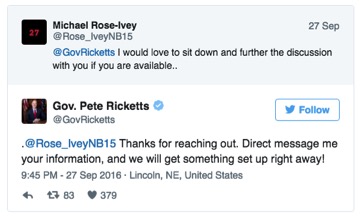Reaching Out, Instead of Lashing Out
“Therefore, if you are offering your gift at the altar and there remember that your brother or sister has something against you, leave your gift there in front of the altar. First go and be reconciled to them; then come and offer your gift.”
Matthew 5:23-24
 What’s your reaction when people strike out at you? How do you respond when someone speaks out in public to ridicule or criticize you?
What’s your reaction when people strike out at you? How do you respond when someone speaks out in public to ridicule or criticize you?
Not long ago, before their game against Northwestern, a trio of Nebraska football players—Michael Rose-Ivey, Mohamed Barry, and DaiShon Neal—“took a knee” during the singing of the National Anthem. Joining a peaceful movement, in which athletes choose to kneel during the anthem, in protest against racial injustices in the US, these three players quietly knelt, held hands, and—according to what they’ve told the media—prayed.
Reaction was swift, with many fans praising the actions of these three football players. However, there were also fans (and others) that lashed out at the trio. Racial epithets were directed toward the three players. Additionally, detractors called for them to be released from the team. According to Michael Rose-Ivey, one person said the three should be hung during the next playing of the National Anthem. While the players received the support of their coach and the president of the University of Nebraska, the governor of Nebraska added his criticism to the rest, calling the action “disgraceful” and “disrespectful.”
In response to the governor’s reaction, Michael Rose-Ivey set an example for all of us. While so many people take to Twitter and other forms of social media to accost, shame, and blame people we have never even met, Rose-Ivey tweeted the governor, telling him he’d like to meet with him to discuss the issue in person. This is the sign of a true leader. Taking the high road when it would be so easy to come out swinging in response, Rose-Ivey completely changed the tone of the conversation by reaching out, instead of lashing out.
To his credit, the governor responded, indicating his acceptance:

Those of us who live in Nebraska breathed a collective sigh of relief. This is what true leadership looks like. The governor may be the elected official, but a twenty-three-year-old linebacker has taken the lead in this instance, showing all of us how it’s done.
As soon as we learn someone has something against us, Jesus admonishes us to go to them. Right away. Jesus even tells us to be about the work of reconciliation before we turn our hearts to worshiping God. Instead of discrediting someone’s character, or digging in our heels, Jesus invites us to make things right, as much as we are able. Instead of closing ourselves off to those who would seek to shame or blame us, Jesus invites us to extend a welcome. It may sound crazy, and it probably feels upside-down, but this is true leadership, and this kind of leadership will change the world for good.
QUESTIONS FOR REFLECTION:
How do you usually respond to criticism? How do you use the Internet and social media to talk about others? Do your conversations (online and in person) serve to build others up, or tear them down?
PRAYER:
Lord, forgive me for the times I’ve responded too quickly to others’ criticism of me. Help me to reach out, instead of lashing out at others. Give me a heart of compassion to help change the world, for good. In Jesus’ name, Amen.
Explore more at the Theology of Work Project online Bible commentary: What is Righteousness? (Matthew 5:17-48)

Deidra Riggs
Writer & Author
Deidra Riggs is a national speaker, an editor, and the founder and host of Jumping Tandem: The Retreat, a bi-annual event for writers, authors, and entrepreneurs. She is a storyteller who creates safe space for navigating...


